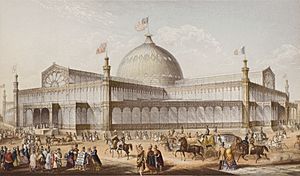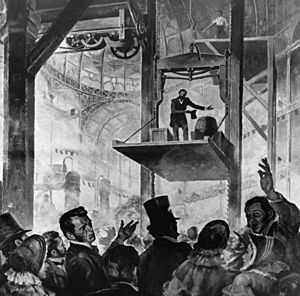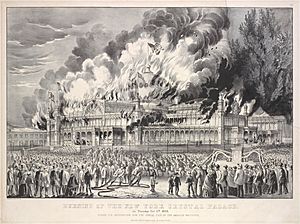New York Crystal Palace facts for kids
Quick facts for kids New York Crystal Palace |
|
|---|---|

The New York Crystal Palace, designed by Karl Gildemeister and Georg Carstensen. This image is an "oil-color" plate by George Baxter, London, dated 1 September 1853.
|
|
| General information | |
| Status | Destroyed |
| Type | Exhibition palace |
| Town or city | New York City |
| Country | United States of America |
| Coordinates | 40°45′13″N 73°59′02″W / 40.75361°N 73.98389°W |
| Inaugurated | 14 July 1853 |
| Destroyed | 5 October 1858 |
| Design and construction | |
| Architect | Georg Carstensen and Charles Gildemeister |
The New York Crystal Palace was a special building made for a big event called the Exhibition of the Industry of All Nations in New York City in 1853. The mayor at the time, Jacob Aaron Westervelt, was in charge of this event. The building stood in a place now known as Bryant Park.
Contents
The Big Exhibition
The 1853 exhibition in New York City took place behind the Croton Distributing Reservoir. This area is now Bryant Park in Manhattan. The New York Crystal Palace was designed by Georg Carstensen and German architect Charles Gildemeister.
The building was inspired by The Crystal Palace in London, which hosted The Great Exhibition in 1851. Like its London cousin, the New York Crystal Palace was built using iron and glass. It was shaped like a Greek cross and had a large dome that was 100 feet wide.
The construction of this amazing building was managed by engineer Christian Edward Detmold. Other important people involved were Horatio Allen, a consulting engineer, and Edmund Hurry, a consulting architect.
Opening Day and Famous Visitors
The New York Crystal Palace officially opened on July 14, 1853. Franklin Pierce, who was the President of the United States, spoke at the dedication ceremony.
Theodore Sedgwick was the first president of the Crystal Palace Association. After a year, he was replaced by Phineas T. Barnum, a famous showman. Barnum helped restart interest in the Palace in May 1854. Well-known speakers like Henry Ward Beecher and Elihu Burritt gave talks there.
A very important demonstration happened at the Crystal Palace in 1854. Elisha Otis showed off his new safety elevator. This elevator had a special brake that would stop the cab from falling if the cable broke. It was a dramatic presentation that changed how tall buildings could be built.
The Latting Observatory
Next to the Crystal Palace was the Latting Observatory. This was a tall wooden tower, about 315 feet high. Visitors could climb it to see far away. From the top, they could see into Queens to the east, Staten Island to the south, and New Jersey to the west.
This tower was the tallest structure in New York City when it was built in 1853. It was even taller than the spire of Trinity Church. The Latting Observatory was shortened in 1855 and sadly burned down in 1856. The Crystal Palace itself was lucky to avoid being destroyed then.
How the Palace Was Destroyed
The New York Crystal Palace was destroyed by a fire on October 5, 1858. At the time, the American Institute Fair was being held there. The fire started in a storage room near 42nd Street.
Within just fifteen minutes, the building's large dome collapsed. In only twenty-five minutes, the entire structure had burned to the ground. Luckily, no one lost their life in the fire. However, the damage to property was huge, costing more than $350,000. This included the building itself, which was worth $125,000, along with many exhibits and valuable statues from the World's Fair.
See also
 In Spanish: Crystal Palace (Nueva York) para niños
In Spanish: Crystal Palace (Nueva York) para niños
 | Frances Mary Albrier |
 | Whitney Young |
 | Muhammad Ali |



